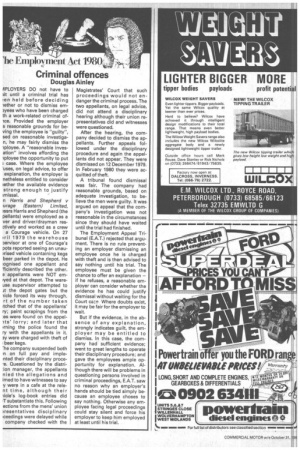le Employment Act 1980 v Criminal offences Douglas Ainley
Page 42

If you've noticed an error in this article please click here to report it so we can fix it.
APLOYERS DO not have to it until a criminal trial has ien held before deciding tether or not to dismiss em)yees who have been charged th a work-related criminal ofice. Provided the employer s reasonable grounds for beving the employee is "guilty", sed on reasonable investigan, he may fairly dismiss the tployee. A "reasonable invesation" involves affording the tployee the opportunity to put ; case. Where the employee 'uses, on legal advice, to offer explanation, the employer is netheless entitled to consider tether the available evidence strong enough to justify ;missal.
n Harris and Shepherd v urage (Eastern) Limited, ssrs Harris and Shepherd (the pellants) were employed as a ver and driver/drayman restively and worked as a crew a Courage vehicle. On 27 iril 1979 the warehouse Pervisor at one of Courage's pots reported seeing an unauwised vehicle containing kegs beer parked in the depot. He :ognised one appellant and ficiently described the other. e appellants were NOT emiyed at that depot. The warese supervisor attempted to it the depot gates but the tide forced its way through. rt of the number taken tchecl that of the appellants' ry; paint scrapings from the :es were found on the appelIts' lorry; and later that irning the police found the Ty with the appellants in it. 3y were charged with theft of beer kegs.
he company suspended both n on full pay and implented their disciplinary proce-e. Questioned by the distri:ion manager, the appellants nied the allegations and imed to have witnesses to say y were in a cafe at the relent time, although their tide's log-book entries did I substantiate this. Following ections from the mens' union )resentatives disciplinary iceedings were delayed while
company checked with the Magistrates' Court that such proceedings would not endanger the criminal process. The two appellants, on legal advice, did not attend a disciplinary hearing although their union representatives did and witnesses were questioned.
After the hearing, the company decided to dismiss the appellants. Further appeals followed under the disciplinary procedure and again the appellants did not appear. They were dismissed on 12 December 1979. In February 1980 they were acquitted of theft.
A tribunal found dismissal was fair. The company had reasonable grounds, based on adequate investigation, to believe the men were guilty. It was argued on appeal that the company's investigation was not reasonable in the circumstances since they should have waited until the trial had finished.
The Employment Appeal Tribunal (E.A.T.) rejected that argument. There is no rule preventing an employer dismissing an employee once he is charged with theft and is then advised to say nothing until his trial. The employee must be given the chance to offer an explanation — if he refuses, a reasonable employer can consider whether the evidence he has could justify dismissal without waiting for the Court cace Where doubts exist, it may be fair for the employer to wait.
But if the evidence, in the absence of any explanation, strongly indicates guilt, the employer may be entitled to dismiss. In this case, the company had sufficient evidence; went to great lengths to operate their disciplinary procedure; and gave the employees ample opportunity for explanation. Although there will be problems in questioning persons involved in criminal proceedings, E.A.T. saw no reason why an employer's hands should be tied simply because an employee choses to say nothing. Otherwise any employee facing legal proceedings could stay silent and force his employer to keep him employed at least until his trial.










































